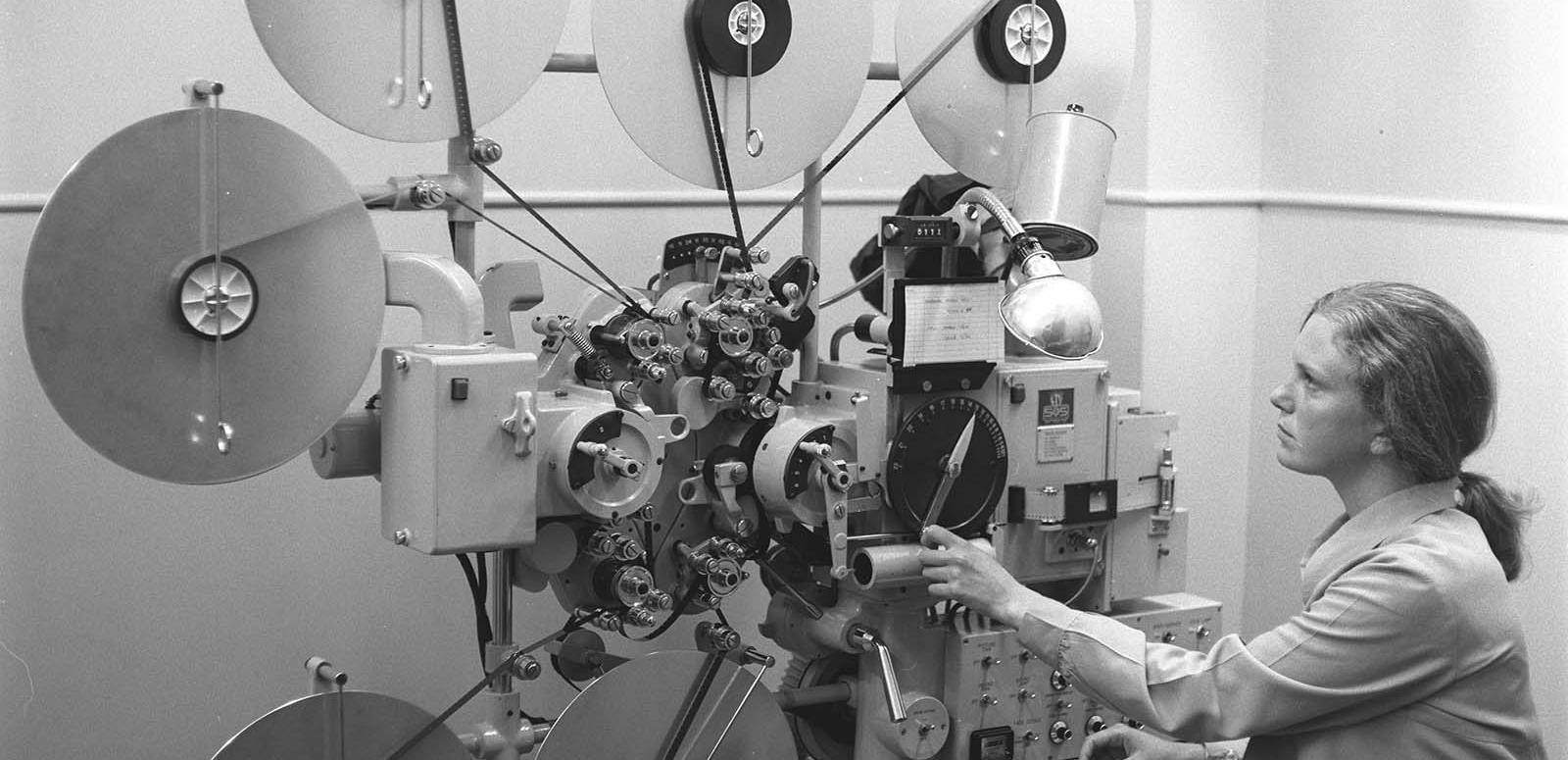

Access Services – Essential Information
Access Services – Essential Information
Please use the NFSA catalogue to identify and request access to specific NFSA collection items.
For questions about accessing and using the NFSA collection, please submit an Access enquiry form.
The Access Services team prioritises requests from the audiovisual industry, media and cultural sectors with clear deadlines. We aim to respond to these requests within 5 working days.
For all other requests we aim to provide an initial response within 30 working days.
We are a small team working hard to respond to a high volume of requests. Thank you for your patience.
Nitrate film materials unavailable
Please note: access to nitrate film materials will be unavailable from March 2025 to June 2027 due to critical building works as part of the NFSA’s Nitrate Extension and Refit Project. These building works are essential to upgrading and enhancing our nitrate storage facilities, ensuring the long-term preservation of these valuable and fragile collections. We appreciate your understanding and patience during this period and look forward to resuming nitrate access requests once the project is complete.
For further information or updates, please contact enquiries@nfsa.gov.au.
Access Services
Our clients
Our services
Collection ownership, including copyright
Costs
NFSA in-kind support
Turnaround times
Time-coded preview materials
Master material delivery formats
Why we may not be able to provide access
Start your collection research
Submit an Access request
How we will assist you
Help us help you
Frequently Asked Questions
Our Clients
Our Access team provides services to professionals working in the:
- audiovisual production industries
- media
- cultural sector
- education sector
- corporate sector
- academia.
While we do not provide copies of collection material for members of the general public, see our Frequently Asked Questions below to find out the many ways individuals can access the NFSA collection.
We've compiled the following information to help Access clients know what to expect. We've also included what to be aware of when working with an archival collection.
Our Services
The Access team facilitates:
- research access to collection materials at NFSA Access Centres in your nearest capital city
- access to copies of footage, sound and images from the collection for use in documentary films, exhibitions, publications, broadcasts, podcasts, live performances and for other specific purposes
- screening loans of film titles to festivals, cinemas and other eligible institutions and organisations for theatrical and non-theatrical screenings
- external loans of original audiovisual components to depositors and distributors
- external loans of original documentation and artefacts from the collection to galleries, libraries, archives and museums for exhibitions.
Collection Ownership and Copyright
The NFSA does not own copyright in a large percentage of materials in our collection.
Depending on the specific material you would like to use there could be additional rights to consider, such as Indigenous Cultural and Intellectual Property (ICIP) rights, moral rights and donor or depositor rights.
Understanding rights is important because it affects how we provide access to the collection as well as the obligations you will need to meet to use our materials.
Please see Collection Ownership and Copyright and our Conditions of Use for more information.
Costs
The NFSA charges fees for Access services. Our staff will provide you with quotes at each stage of your request so that you have a clear understanding of the costs involved prior to any work being undertaken.
For more information, including NFSA rates and Frequently Asked Questions about our fees, please see Access Fees and Conditions of Use.
NFSA In-kind Support
In-kind support is available to eligible Australian creators through our Zero Fee Licence program.
Please note that not all collection materials are available under this initiative and fees and conditions apply.
If you do not qualify for Zero Fee Licence, your request will be handled as a standard access request and will be subject to our standard Access Fees and Conditions of Use.
Turnaround Times
The NFSA’s mission to collect, preserve and share Australia’s audiovisual heritage means that our Access services differ from a commercial supplier of stock footage, sound and images.
One of the NFSA’s priorities is to digitise its vast analogue collection. This is an ongoing effort, and some of our collection hasn’t been digitised yet. Material in analogue format will take longer to access.
When working with an archival collection, it takes time to:
- research the collection
- access time-coded preview materials
- clear copyright and obtain any other permissions applicable to your request
- finalise your master order
- digitise materials and prepare them for loan.
We suggest allowing a minimum of eight weeks in your production or project schedule. Turnaround times will vary greatly and the process could be quicker or take much longer depending on the nature, scale and complexity of your request.
Time-coded Preview Materials
If you locate footage from the NFSA collection online that you are interested in using, please submit your request through the NFSA catalogue. Time-coded preview copies are supplied at no cost.
Working from time-coded preview materials in the research and ‘rough cut’ phase of your project will enable you (and us!) to accurately identify collection material and to efficiently locate any clips we need to supply as master quality copies for your final cut.
Not obtaining time-coded screeners at the beginning of your project might result in an additional service fee, to cover our staff’s time to eye-match your master order.
Master Material Delivery Formats
We can supply master material in just about any digital file format you require. But keep in mind that the quality of a digital master will reflect the format and condition of the original analogue materials used to create it.
For instance, not all moving image titles in the collection can be made available in HD, 2K or 4K. And where deterioration or production faults are present in an analogue master, these issues cannot always be rectified.
If you have specific requirements, please provide full technical specifications to the staff member handling your request. Then we can confirm if we can supply the collection material you are interested in, to your specifications.
Why We May Not Be Able to Provide Access
Sometimes, the item you request will not be available. If we are unable to provide access, we will give you a reason. It will usually be because the item is not held in an accessible audiovisual format or because a restriction is in place.
Preserving the collection at the highest international archival standards is a huge undertaking and not all items are held in an accessible audiovisual format. Our staff assess Access enquiries on a case-by-case basis and the NFSA reserves the right to determine which analogue titles, if any, can be prioritised for digitisation at the request of clients.
‘Restrictions may apply’ appears in the catalogue record for collection items with restrictions. Material may be restricted for a range of reasons, such as:
- Containing culturally sensitive Aboriginal and Torres Strait Islander footage, sound or images
- Having an embargo in place because of commercial obligations – for new productions awaiting commercial release
- Having an embargo in place at the request of a participant – for example, an oral history interviewee may stipulate that access is not permitted until after their death
- Being assessed by our conservators as being too fragile to be handled or loaned.
Start Your Collection Research
We encourage our clients to complete their own collection research by searching online:
- Search the NFSA catalogue to identify and request specific items in the NSFA collection
- Film Australia Collection Library catalogue: the NFSA is the custodian of the Film Australia Collection (FAC), which contains over 3,000 documentary and docudrama titles produced by the Commonwealth between 1913 – 2008. Most titles in the FAC are digitised, shot-listed and can be licensed for use directly by the NFSA. The FAC has its own catalogue – Film Australia Collection Library catalogue
- Online platforms: selected material from our collection can be browsed on our online platforms:
- Curated Collections
- NFSA Films YouTube channel
- NFSA SoundCloud
- australianscreen online
Submit an Access Enquiry
General questions about accessing and using the NFSA collection can be made using the Access enquiry form.
Our staff will respond within the timeframes listed at the top of this page.
How We Will Assist You
We will assign a member of our team to your enquiry and they will be the primary point of contact for your request.
Our staff are experienced at guiding clients through the process of accessing the collection for research, copies and loans. But the work of researching our catalogues, tracing rights holders and obtaining rights clearances will be your responsibility.
We undertake to:
- communicate with you in a professional and timely manner
- give you any contact information we may have to assist with tracing copyright holders and other rights holders, such as community representatives for Indigenous and Cultural and Intellectual Property (ICIP) rights permissions
- provide suggestions for additional or alternative collection materials that you may wish to consider, where relevant
- provide itemised quotes and realistic turnaround times for work to be undertaken so that you can decide if the NFSA's offer meets your budget and deadlines.
If you have an urgent query about an active request and are unable to reach your NFSA Access contact, please submit an Access enquiry form.
Help Us Help You
We understand that our clients’ work is often deadline driven and that your priorities and requirements may change during the course of your request.
We ask that you:
- observe our response times to new enquiries – we will respond sooner if we can
- allow adequate lead time to trace copyright owners and obtain permissions
- allow adequate lead time to fulfil ICIP rights obligations if you plan to work with Aboriginal and Torres Strait Islander collection materials
- submit an application for Zero Fee Licence early in your contact with us if you are eligible for, and plan on participating in, this initiative
- communicate your master / final order clearly, including provision of NFSA title numbers and accurate timecode ‘in’ and ‘out’ points for any clips
- consider any alternative, more accessible materials if specific collection items cannot be made available within your timeframe or budget
- provide feedback to help us maintain and improve our services.
Frequently Asked Questions
About the collection
What does the NFSA collect?
Why are there gaps in the collection?
Who owns copyright in the collection?
Accessing or using the collection
How is the general public able to access the collection?
Is everything in the collection online?
Can I use collection material published on the NFSA’s website, online platforms and social media channels?
Can I link to collection material published online?
I’m a fan of an item in the collection – can I get a copy?
A member of my family appears in the collection – can I get a copy?
Fees
See Access Fees and Conditions of Use for FAQs about our fees.
Other archives
If the NFSA does not hold what I am looking for, where else could I search?
About the Collection
What does the NFSA collect?
From the oldest surviving film and sound recording produced in Australia (both from1896) to the present day, the NFSA collection captures a ‘living’ record of the nation. A record of Australia's people, places and events – of who we are and were, and who we want to be.
Films, sound recordings and other audiovisual works in the collection include:
- actuality
- advertisements
- documentaries
- feature films
- field recordings
- games
- home movies
- musical recordings
- networked media
- newsreels
- podcasts
- radio
- short films
- spoken word recordings
- television.
A large part of the collection is also made up of documentation and artefacts and includes:
- costumes
- memorabilia
- oral history interviews with people from the creative industries
- personal papers
- photographs
- posters
- props
- scrapbooks
- scripts
- sheet music
- vintage equipment.
For more information see What We Collect and our Collection Policy.
Why are there gaps in the collection?
The NFSA collection is very large, but it is not a complete repository of Australia’s entire audiovisual heritage. There are several reasons for this:
No legal deposit for audiovisual works in Australia
This means that creators and/or copyright owners are not obliged to provide a copy of their work to the NFSA.
Survival of audiovisual works
By their nature, audiovisual recording formats are often physically fragile and quickly become obsolete as technology changes. Some works are not in the NFSA collection simply because no copies are known to survive.
Our work to collect Australia’s audiovisual heritage is a twofold task of bringing newly-produced works into the collection and finding and recovering older works. See Most Wanted for a list of works that our curators are currently searching for.
Curatorially-driven Collection Policy
We acquire audiovisual works for the collection in line with our Collection Policy.
It’s not practical for us to collect everything. Our curators choose what material is acquired for the collection.
The work is held by another collecting institution
Our curators may decide not to acquire an audiovisual work for the NFSA collection if it is already preserved in the collection of other collecting institutions.
Who owns copyright in the collection?
Copyright and other intellectual property rights in audiovisual materials are complex. For further information please see Collection Ownership and Copyright.
Accessing or Using the Collection
How is the general public able to access the collection?
The public is able to access many titles from the collection online. For further details, including relevant links, please see ‘Is everything in the collection online?’, below.
The public can also access the collection by using our Access Centres service.
Many NFSA exhibitions, screenings and events feature material from the collection. To find out events and exhibitions, please visit our Canberra Experiences page.
Is everything in the collection online?
No. But a lot is!
Hundreds of hours of material from the collection are available to view and listen to online for free. You can browse:
- Curated Collections
- Films and mash-ups on the NFSA Films YouTube channel
- Music, sound recordings, field recordings and oral histories on our SoundCloud channel
- australianscreen
NFSA Online Shop – selected titles from the collection, including Film Australia documentaries, are available to purchase as digital files from our Online Shop for use by educational institutions, cultural institutions and individuals
Kanopy – if you are a member of a public library, you can stream selected titles from the collection for free on Kanopy
Education Shop – some titles can be also purchased from The Education Shop
Social media – to keep up to date with all the latest NFSA stories, collection finds and news, we invite you to follow us on:
Can I use collection material published on the NFSA’s website, online platforms and social media channels?
Unless stated explicitly, NFSA collection material published on our website, online platforms and social media channels is not automatically available for others to use. While you may not download and republish or reuse the content, you may use the sharing functionalities available on social media channels or link to the content.
If you have found footage, sound or images from the collection online and you would like to republish or use the material in any way, please submit an Access enquiry form.
Can I link to collection material published online?
We are generally happy for organisations and individuals to link to NFSA collection material as it appears on our websites or social media channels.
Depending on the specific collection material that you want to link to, there may be a requirement to attribute the donor and/or copyright holder in addition to acknowledging the NFSA. So please inform us and check the correct attribution by contacting comms@nfsa.gov.au.
I’m a fan of an item in the collection – can I get a copy?
The NFSA does not provide copies of collection material for personal use or interest.
We are only able to offer onsite viewing in a NFSA office or a state library. See Access Centres for location details.
Onsite viewing is limited to collection material already digitised.
Please identify the relevant items in the NFSA catalogue.
A member of my family appears in the collection – can I get a copy?
We may be able to supply a copy of collection material to you if you have a proven, direct personal connection to a title.
Availability is not guaranteed and will depend on several factors, such as copyright, the condition of the material and the format in which the work is held.
We assess these types of requests on a case-by-case basis. Access Fees and Conditions of Use apply.
Please identify the relevant items in the NFSA catalogue.
Fees
See Access Fees and Conditions of Use for FAQs about our fees.
Other Archives
If the NFSA does not hold what I am looking for, where else could I search?
Depending on the nature of the material that you are looking for, you could try:
Australia
Australian Centre for the Moving Image
Australian Institute of Aboriginal and Torres Strait Islander Studies (AIATSIS)
National Archives of Australia
Trove – the National Library of Australia’s Trove can assist you to locate audiovisual items held in the collections of libraries around Australia
International
International Federation of Film Archives (FIAF) maintains lists of international audiovisual archives on its Community Member and Community Associate pages
South-East Asia-Pacific Audio Visual Archive Association (SEAPAVAA) maintains a list of audiovisual archives in countries in South-East Asia and the Pacific.
The National Film and Sound Archive of Australia acknowledges Australia’s Aboriginal and Torres Strait Islander peoples as the Traditional Custodians of the land on which we work and live and gives respect to their Elders both past and present.

